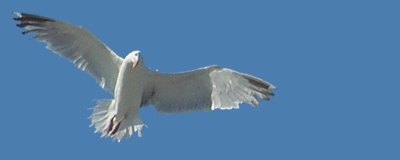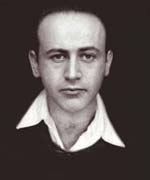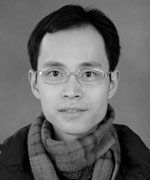|
|
 |
 |

Paul Celan
保罗-策兰
  Paul Celan (1920-1970) was influenced by French surrealism and symbolism. Author of The Sand from the Urns (1948), Poppy and Memory (1952), From Threshold to Threshold (1955), Speech Grille (1959), and Snow Part (1971). He also translated literature from Romanian, French, Spanish, Portuguese, Italian, Russian, Hebrew and English into German. Paul Celan (1920-1970) was influenced by French surrealism and symbolism. Author of The Sand from the Urns (1948), Poppy and Memory (1952), From Threshold to Threshold (1955), Speech Grille (1959), and Snow Part (1971). He also translated literature from Romanian, French, Spanish, Portuguese, Italian, Russian, Hebrew and English into German.
保罗-策兰(1920-1970)深受法国超现实主义和象征主义的影响。他的诗集主要有:《骨灰翁之沙》(1948),《罂粟与记忆》(1952),《从门槛到门槛》(1955),《语言栅栏》(1959)以及《雪之部》(1971),他曾经将包括罗马尼亚语、法语、西班牙语、葡萄牙语、意大利语、俄语、希伯来语和英语在内的多国文学翻译成德语。
|

|

译者
Translator
冯冬
Peter Feng
 
冯冬,2011年从南京大学英语系获博士学位,致力于诗、哲学、精神分析的共通,译过小说、游记、当代外国诗,包括《未来是一只灰色海鸥:西尔维娅-普拉斯诗全集》(上海译文出版社,2013)。其对诗之本质陌异性的关注凝结成三本诗集:《残酷的乌鸦》(与孙冬合著,南京大学出版社,2011)、《沙漠泳者》(泼先生出版,2015)、《平行舌头》(台湾秀威资讯,2015)。原创作品刊于《诗天空》《美国诗歌评论》等海内外诗刊。
Peter Feng received a PhD in English Literature from Nanjing University in 2011, and since then he has been exploring the interconnections between poetry, philosophy, and psychoanalysis. He has translated a novel, three travelogues, and numerous poems in English, including The Collected Poems of Sylvia Plath (Shanghai Translation Publishing House, 2013). His phenomenological approach to poetry crystallizes into three books of poems: Cruel Raven (coauthored with Sun Dong, Nanjing University Press, 2011), The Desert Swimmer (Pulsasir Publishing, 2015), Parallel Tongues (Showwe Information Co., Ltd., 2015). His works appear in Poetry Sky, Chinese/Western Poetry, The American Poetry Review and many others.
|
 |
Psalm |
 |
诗篇 |
No one moulds us again out of earth and clay,
no one conjures our dust.
No one.
Praised be your name, no one.
For your sake
we shall flower.
Towards
you.
A nothing
we were, are, shall
remain, flowering;
the nothing-, the
no one's rose.
With
our pistil soul-bright,
with our stamen heaven-ravaged,
our corolla red
with the crimson word which we sang
over, o over
the thorn
|
|
无人再以泥土与黏土捏制我们,
无人向我们的尘埃吹气。
无人。
赞美你啊,无人。
为了你,我们
愿意开花。
向着
你。
一个无
我们曾是,现在是,将来
也是,绽开着:
那无的,无人的
玫瑰。
以
灵魂般闪亮的雌蕊,
被天堂损毁的雄蕊,
被紫红之词
染红的花冠,那是我们
在荆棘之上
之上的
歌唱。
|
 |
Tübingen, January |
 |
图宾根,一月 |
Eyes talked into
blindness.
Their—“an enigma is
the purely
originated”—, their
memory of
H?lderlin towers afloat, circled
by whirring gulls.
Visits of drowned joiners to
these
submerging words:
Should,
should a man,
should a man come into the world, today, with
the shining beard of the
patriarchs: he could
if he spoke of this
time, he
could
only babble and babble
over, over
againagain.
(“Pallaksh. Pallaksh.”)
|
|
被说服
致盲的眼睛。
他们的——“纯粹的
起源是一个
谜”——,他们
关于漂浮的荷尔德林塔楼
的记忆,被海鸥的嗡鸣
环绕。
溺水的木匠
造访
这些浸没之词:
如果,
如果一个人来,
如果一个人今天来这世上,带着
光焰四射的
族长胡须:他可以
谈论这个
时代,他
只能
胡言乱语
始终
咿咿,呀呀。
(“可否。可否”)
|
 |
Todtnauberg |
 |
托特瑙堡 |
Arnica, eyebright, the
draft from the well with the
starred die above it,
in the
hut,
the line
—whose name did the book
register before mine? —
the line inscribed
in that book about
a hope, today,
of a thinking man's
coming word
in the heart,
woodland sward, unlevelled,
orchid and orchid, single,
coarse stuff, later, clear
in passing,
he who drives us, the man,
who listens in,
the half-
trodden wretched
tracks over the high moors,
dampness,
much.
|
|
山金车,小米草,
井里舀水喝,上方一颗
星形骰子,
在那
小屋里,
记入留言薄
——在我之前
它还记下谁的名字?——
在这本书中
写下那行
希望的字,今天,
为了一个思想的词
在心中
到来,
林中草地,未平整,
红门兰与红门兰,独自地,
率直,后来,在车上,
清清楚楚,
为我们开车的人,那人
也听见了,
走了一半的
高地沼泽里的
圆木小路,
非常,
潮湿。
|
|
|







